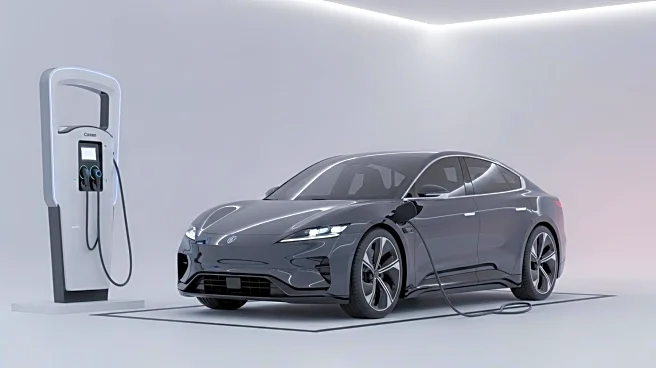What is the story about?
What's Happening?
The Trump administration is set to end federal tax credits for electric vehicles (EVs), leading to a surge in sales as consumers rush to take advantage of the expiring incentives. The $7,500 tax credit for new EVs and $4,000 for used EVs will expire on Tuesday, prompting increased interest at the Orange County Auto Show and among dealerships nationwide. John Sackrison, executive director of the Orange County Automobile Dealers Association, noted a significant spike in EV sales as the deadline approaches. Nationally, EV sales jumped 19% in July compared to the previous year, with predictions of record sales this month. The expiration of these credits comes amid volatile tariffs imposed by President Trump, affecting the cost of cars and parts from overseas.
Why It's Important?
The expiration of EV tax credits is likely to have a significant impact on the automotive industry and consumer behavior. The credits have been a major incentive for consumers to switch to electric vehicles, contributing to the growth of the EV market. With their removal, analysts predict a decline in EV sales starting in October, as the incentive to purchase these vehicles diminishes. This change could slow the transition to greener transportation options, affecting efforts to reduce carbon emissions. Additionally, the tariffs on imported car parts may further increase costs for consumers, potentially discouraging EV purchases.
What's Next?
As the tax credits expire, the automotive industry may face challenges in maintaining the momentum of EV sales. Dealerships and manufacturers might need to explore alternative incentives to attract buyers. State governments, like California, may step in to provide support for EV adoption, as federal backing wanes. Consumers who miss the deadline may shift their focus to hybrid vehicles or other affordable options. The industry will likely experience a period of adjustment as it navigates these changes.
Beyond the Headlines
The end of federal EV tax credits raises questions about the future of sustainable transportation in the U.S. Without these incentives, the pace of EV adoption may slow, impacting environmental goals and the development of related infrastructure. The decision also highlights the broader policy shifts under the Trump administration, which have included rollbacks on environmental regulations. This could lead to increased advocacy for state-level initiatives to support clean energy and transportation.















